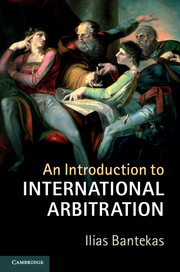Book contents
- Frontmatter
- Epigraph
- Contents
- Preface
- Table of cases
- Table of treaties
- Table of domestic laws
- Institutional Rules and Soft Law
- List of abbreviations
- 1 An introduction to international arbitration
- 2 The laws and rules applicable to arbitration
- 3 The agreement to arbitrate
- 4 The arbitral tribunal
- 5 Arbitration and the courts
- 6 The conduct of arbitral proceedings
- 7 Arbitral awards and challenges against awards
- 8 Recognition and enforcement of arbitral awards
- 9 Consumer and online arbitration
- 10 Investment arbitration
- Index
5 - Arbitration and the courts
Published online by Cambridge University Press: 05 August 2015
- Frontmatter
- Epigraph
- Contents
- Preface
- Table of cases
- Table of treaties
- Table of domestic laws
- Institutional Rules and Soft Law
- List of abbreviations
- 1 An introduction to international arbitration
- 2 The laws and rules applicable to arbitration
- 3 The agreement to arbitrate
- 4 The arbitral tribunal
- 5 Arbitration and the courts
- 6 The conduct of arbitral proceedings
- 7 Arbitral awards and challenges against awards
- 8 Recognition and enforcement of arbitral awards
- 9 Consumer and online arbitration
- 10 Investment arbitration
- Index
Summary
Introduction
This chapter is a seeming misfit in a book dealing with a private method of dispute resolution. Surely, the very rationale of arbitration is aimed at leaving the courts outside the parties’ dispute. In the course of this chapter the reader will discover that arbitration needs the courts but the courts do not need arbitration – only insofar as this is desired to reduce their work loads. Without an effective judicial system and domestic arbitration laws that cater for a synergy between tribunals and the courts, arbitration may ultimately run into a dead end. The courts are there to make sure that unless there are serious legal impediments for arbitration to continue, that no one or anything can effectively delay or terminate arbitral proceedings or in any other way frustrate the parties’ agreement to arbitrate.
This chapter will examine the relationship between arbitral tribunals and the courts of the seat, as well as their relationship with the courts of third nations and transnational courts. It will go on to examine the role of the courts prior to and after the constitution of the tribunal as well as once arbitral proceedings have been terminated.
The relationship between tribunals and the courts
It should have become clear so far that although it is possible for an arbitral process to commence and terminate without any recourse to the local courts, the tribunal does not operate outside the lex arbitri and in addition if it runs into trouble (e.g. the parties cannot agree on the person of the chairman) the local courts assume a critical role. Hence, tribunals are dependent on the local courts in order to resolve certain procedural disputes over which they have no discretionary powers or authority. However, one should not go as far as to argue that tribunals are subservient to the courts. The authority of the courts extends only to those issues of the arbitral process that are either outside the scope of the parties’ agreement (e.g. third-party disclosure) or which are covered by a public policy rule (e.g. absence of equal treatment). This conclusion is further justified by the prohibition of appeals against arbitral awards.
- Type
- Chapter
- Information
- An Introduction to International Arbitration , pp. 131 - 159Publisher: Cambridge University PressPrint publication year: 2015



